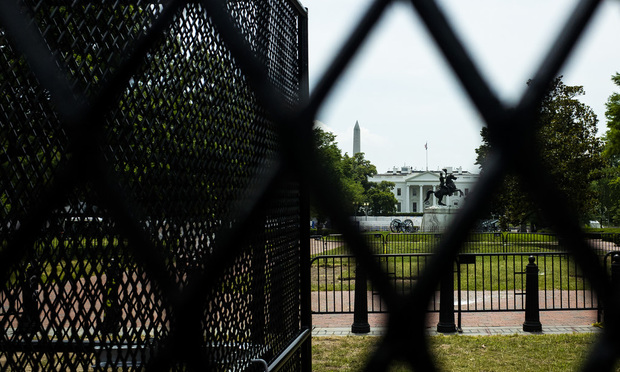 Thousands march in Washington, D.C. protesting police brutality and the killing of George Floyd in Minnesota at the hands of local police, on Saturday, June 6, 2020. Derek Chauvin, the police officer that was caught on video kneeling on Floyd’s neck for nearly 9 minutes as the unarmed, handcuffed man laid flat and unable to breathe, has been charged with third-degree murder and second-degree manslaughter. Mass demonstrations have taken place nationwide since the incident took place.
Thousands march in Washington, D.C. protesting police brutality and the killing of George Floyd in Minnesota at the hands of local police, on Saturday, June 6, 2020. Derek Chauvin, the police officer that was caught on video kneeling on Floyd’s neck for nearly 9 minutes as the unarmed, handcuffed man laid flat and unable to breathe, has been charged with third-degree murder and second-degree manslaughter. Mass demonstrations have taken place nationwide since the incident took place.In a conference call with the nation’s governors last month, President Trump threatened to deploy the United States military to restore order following protests over the alleged police murder of George Floyd. Putting aside the moral and political issues raised by this threat, would deployment of the military at this time, in the absence of a governor’s request to do so, be lawful? Analysis begins with the Posse Comitatus Act, 18 U.S.C. § 1385, which prohibits the use of the Army or Air Force to enforce the law “except in cases or under circumstances expressly authorized by the Constitution or Act of Congress.” Three statutory authorizations, collectively known as the Insurrection Act are potentially relevant. First, 10 U.S.C. § 251 permits the use of the military to suppress “insurrection”, but it requires the request of the state government. That statute was used to authorize the use of federal troops during the riots of the 1960s. Second, 10 U.S.C. § 252 permits the use of federal troops whenever “the President considers that unlawful obstructions, combinations, or assemblages, or rebellion against the authority of the United States, make it impracticable to enforce the laws of the United States in any State by the ordinary course of judicial proceedings.” That statute was enacted in 1861 to ratify Lincoln’s call for troops at the beginning of the Civil War. Third, 10 U.S.C. § 253 authorizes the president to use federal troops when insurrection or conspiracy denies any class of citizens their constitutional rights or obstructs the enforcement of federal law. That statute was used to override state resistance to federal court desegregation orders by President Eisenhower in Arkansas and President Kennedy in Mississippi and Alabama. We do not believe that § 251, which requires a state request, or § 253, which requires denial of equal protection or obstruction of federal law, could reasonably justify the use of the military in the present circumstances absent state invitation. Section 252 would likely be the purported authority the president would use.
Whether the president’s “consideration” that the use of the regular armed forces in response to the current demonstrations would be subject to judicial review is unsettled. The Supreme Court held in the Prize Cases, 5-4, that Lincoln’s call for troops, later ratified by Congress, was within the executive power, but that involved formal war against a de facto rebel government that controlled substantial territory. After the 1968 riots provoked by the murder of Dr. Martin Luther King, a district court dismissed a property insurer’s Tort Claims Act suit against the United States, holding that under the act the decision whether and when to use troops was a discretionary function protected by sovereign immunity. The opinion contains dictum that the president’s authority over the use of troops is not subject to judicial review. Under the Youngstown analysis, the breadth of the delegation of power in § 252, coupled with whatever inherent authority the president has under Article II, leans against judicial review. But it is by no means certain that the courts would defer to a presidential decision that peaceful mass civil disobedience amounts to an “unlawful combination, insurrection or rebellion,” particularly if the courts remain open, the enforcement of local criminal law continues to function, and state authorities do not request federal assistance.
In any event, the president’s contingent threat has prompted a crisis in civil-military relations. In response, the current secretary of defense publicly stated that the use of the regular military should “only be used as a matter of last resort and only in the most urgent and dire of situations.” His immediate predecessor as secretary, retired General James Mattis, has concurred in that warning and denounced the president’s divisive leadership. The Chairman of the Joint Chiefs of Staff found it necessary to send a message to senior military commanders reaffirming that every member of the armed forces has sworn an oath to defend the Constitution, including the First Amendment right of peaceful assembly. He added a handwritten postscript that “we all committed our lives to the idea that this is America – we will stay true to that oath and to the American people.” As unexceptional as these sentiments may seem at first glance, it is a matter of grave concern that the senior leadership of the armed forces, without crossing the line of outright insubordination, finds it necessary to warn implicitly that that some potential orders might be unconstitutional and obedience contrary to their oath. A shot has been fired across the president’s bow, and we have moved one step closer to the kind of republic where soldiers’ opinions matter. It should never have come to this.
"use" - Google News
July 12, 2020 at 09:00PM
https://ift.tt/300HQ6l
Trump Was Wrong to Threaten Use of Military During Protests | New Jersey Law Journal - Law.com
"use" - Google News
https://ift.tt/2P05tHQ
https://ift.tt/2YCP29R
Bagikan Berita Ini














0 Response to "Trump Was Wrong to Threaten Use of Military During Protests | New Jersey Law Journal - Law.com"
Post a Comment